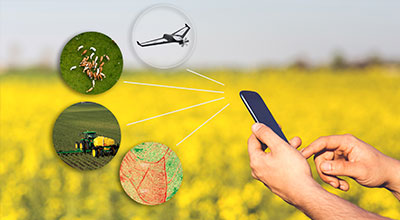 Image: Pixabay
Image: PixabayThe CNA/Senar System promoted the live “Bioinputs in maintaining soil fertility”, on Thursday (28). The meeting was moderated by the agronomist and graduate of the CNA Jovem program, Murilo Nunes Valenciano, and was attended by the researcher from Embrapa Milho e Sorgo, Christiane Abreu de Oliveira Paiva; the agronomist and graduate of CNA Jovem, Maria Iderlane de Freitas; and the professor at the Federal University of Lavras (UFLA), Paulo Henrique Leme.
Murilo and Maria Iderlane are members of the EducaAgro Team, winner of the 2020/21 CNA Jovem with the development of the Bioinputs Intelligence Center. He highlighted the importance of discussing the topic at a turbulent time in which it is essential to seek alternative ways to preserve soil fertility and the high productivity of Brazilian agriculture.
Christiane Abreu de Oliveira Paiva addressed the topic “Bacteria and fungi: efficient nutrient cycling before the fertilizer era”. She spoke about biological solutions for increasing nutrient use efficiency, microbiological inoculants to mitigate stress and efficient phosphorus cycling in the production system, in addition to presenting Embrapa’s portfolio of bioinputs.
{module Form RD}
Maria Iderlane explained how the idea of creating the Bioinputs Intelligence Center came about – an environment for information and connections with experts to facilitate the safe use of this type of product. The CNA Jovem graduate gave a presentation to explain the differences between fertilizers, bioinputs, biofertilizers, inoculants, soil conditioners and soil remineralizers.
“In 2021, 85% of the fertilizers used in Brazil were imported. The implementation of strategies that make agricultural production viable and minimize dependence on external inputs, such as the use of biological inputs based on organic waste and/or microorganisms, is essential,” he said.
The UFLA professor, who was a mentor for the EducaAgro group at CNA Jovem, highlighted the importance of disseminating and expanding knowledge about bioinputs. According to him, the bioinputs market was R$1.7 billion in Brazil in 2020/21, which means an increase of R$371 million compared to the previous year. The global market is around R$5 billion and is expected to grow by R$107 million by 2030.
“This is a good economic moment for the expansion of bioinputs. Brazilian farmers have taken advantage of the opportunity to work with bioinputs and have understood that these products, in addition to being an ecological and economical alternative, can give them greater freedom to manage their crops,” said Paulo Henrique Leme..
Per: AGROLINK










